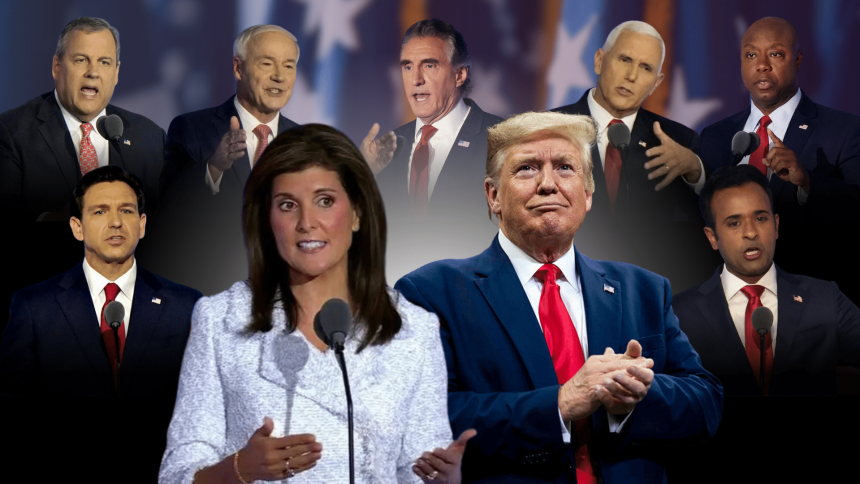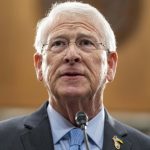The air was thick with tension, ambitions, and political warfare Wednesday night as the GOP hopefuls gathered in Milwaukee for their first debate of the 2024 primary season. As the Republican contenders sparred and showcased their stances on the debate stage, it was quickly evident that the GOP is still struggling with its past while attempting to cautiously chart its future.
Nikki Haley, the former South Carolina governor and U.S. ambassador to the United Nations, unapologetically stole the show early on, taking her fellow Republicans to task for their reckless spending habits. She dismissed the popular tactic of blaming Biden and placed shared responsibility squarely on the GOP’s doorstep. Her standout moment came when she sharply criticized Ron DeSantis, Mike Pence, and Tim Scott for their support of the bloated spending during Trump’s tenure.

“Biden didn’t do this to us; our Republicans did this to us too … Trump added $8 trillion to our debt and our kids are never going to forgive us for this,” Haley declared. With lines like, “Trump is the most disliked politician in America,” it’s clear Haley is making an ambitious push to position herself as the most compelling Trump alternative in the race.
Still, the Trump factor loomed large over the debate stage. The ex-president tried overshadowing the event with a pre-taped interview with former Fox News host Tucker Carlson. But Asa Hutchinson of Arkansas and Chris Christie of New Jersey weren’t deterred in voicing their disdain for Trump. Both expressed reservations about supporting a potentially-convicted Trump in the future, with Christie fervently stating that Trump’s conduct is “beneath the office of President of the United States.” Christie’s remarks, often met with boos from the GOP crowd, highlighted the deep schism within the party between the staunch Trump loyalists and those eager to turn the page. Despite his nonattendance, the former president’s shadow was ever-present, illustrating the challenge his competitors face in attempting to carve out their space in a party still very much in Trump’s grasp and in a media environment still giving Trump all its valuable attention.
However, it was Vivek Ramaswamy, the young tech entrepreneur turned political aspirant, who was one of the evening’s biggest surprises. Despite DeSantis’ consistent position running second in the polls behind Trump, the GOP establishment’s arrows were instead aimed at Ramaswamy. The attacks on the young candidate, especially Haley’s sharp critique of Ramaswamy’s lack of foreign policy experience, underscored his recent ascent in the polls. Toeing a hard line, Ramaswamy asserted he was the only one “not bought and paid for.” At one point, Ramaswamy retorted with, “I’m a skinny guy with a funny name,” mirroring Barack Obama’s memorable 2004 introduction.
Topics like crime, China, Ukraine, fentanyl, and education dominated, and responses were varied. While Ramaswamy and DeSantis leaned into border security when quizzed about Ukraine, Haley took on the role of the foreign policy expert, skewering Ramaswamy while calling him out for prioritizing domestic issues over international alliances. Her pointed remarks like, “We have to face the fact that Trump is the most disliked politician in America,” revealed her broader strategy: running as the rational alternative to Trump.
And therein lies the crux of this GOP campaign. It’s shaping up as a battle between Trump and the anti-Trumps. The dynamics before the debate suggested an anticipated pile-on for DeSantis, who, despite trailing Trump in polls, has remained the leading non-Trump challenger. Yet, DeSantis was eclipsed by the Ramaswamy phenomenon, receding into the backdrop of Ramaswamy’s exuberance and showmanship. With Ramaswamy and DeSantis deeply entrenched in Trump’s political lane and drawing from a similar political base, it paved the way for Haley, Scott, Christie, and Pence to contrast themselves as the real alternatives to Trump.
And let’s not forget the financial battleground surrounding these campaigns. GOP donors are split — Trump loyalists who continue to back him financially and a growing cohort of Trump dissenters who have made the pivotal decision not to. As the field narrows, the last anti-Trump candidate standing might just inherit a treasure trove of the establishment GOP’s fundraising and financial machinery.
For now, the GOP stands at an identity crossroads, torn between its Trumpian past and an uncertain future. The debate only muddled the campaign scene further. DeSantis, Ramaswamy, and Trump seem to be wooing the same voter base, while Pence, Christie, Haley, and Scott are working to position themselves as the mainstream alternatives. Other contenders remain on the periphery —Hutchinson, Burgum, and others — barely causing ripples in the polls.
So who won the debate? DeSantis – who needed a strong showing – faltered not from missteps but from failing to create excitement, appearing overly rehearsed and robotic. Ramaswamy has emerged as the surprise element in the race, but there’s a looming question of how far he can truly go with Trump running in the same lane. Pence showed moments of clarity but often seemed more embroiled in the debate’s chaos than transcending it. Christie’s audacious critiques of Trump, echoed by the crowd’s boos, indicate that he faces an uphill battle.
That leaves Nikki Haley and Tim Scott, both of whom currently poll between 3% and 4% nationally. While Scott remained consistent and didn’t hurt himself, it was Haley who shone brightest. She showed a pragmatic awareness of broader national issues, suggesting she’s attuned not just to the base but also to the wider electorate. Haley helped herself more than any other candidate in the debate – going from “also ran” status to capturing a significant portion of the post-debate media attention. And in the renewed attention on Haley, the GOP might find that it has all the right ingredients for a candidate able to win a general election showdown in 2024.
Born in Bamberg, South Carolina, to immigrant Sikh parents from Punjab, India, Haley’s life tale is a telling of the American dream. As a 12-year-old, she began assisting with bookkeeping in her mother’s clothing store, exhibiting early signs of an entrepreneurial spirit. Her initial business acumen blossomed further when she graduated from Clemson University with an accounting degree in 1994. Before long, Haley was not just involved in her family’s clothing venture but was making waves as treasurer and eventually president of the National Association of Women Business Owners.
The political realm called her name in 2004 when she was first elected to the South Carolina House of Representatives, a role she held for three terms. By 2010, she broke barriers by becoming the first female and the youngest governor of South Carolina, as well as only the second governor of Indian descent in the U.S., following Bobby Jindal. Her husband, an officer in the South Carolina Army National Guard, was deployed to Afghanistan in 2013, adding another layer of complexity to her life as governor.
Beyond her gubernatorial accolades, Haley represented the U.S. with distinction as the ambassador to the United Nations from 2017 to 2018. Her tenure was marked by an assertive stance on global issues, coupled with a diplomatic finesse that resonated even with her critics.
Haley’s debate challenges to the party’s stance on issues like abortion were emblematic of her approach – pragmatic, empathetic, yet resolutely conservative. During the debate, she asked, “Can’t we all agree that we are not going to put a woman in jail or give her the death penalty if she gets an abortion?” An astute question, given that Republicans are presently facing a losing battle on abortion in recent statewide referendums and experiencing deteriorating national polling on the issue. As a woman, Haley offers a nuanced perspective in these debates, advocating for a pro-life stance, yet recognizing the importance of practicality in governing.
The GOP’s 2024 path is still unfolding, and many questions persist. Yet, the debate proved that the wisdom of sidelining Nikki Haley becomes more questionable with each passing day. In her, the GOP might uncover its next chapter, seamlessly aligning its foundational principles with a candidate who understands America’s contemporary heartbeat.
The views expressed by contributors are their own and not the views of SuperTalk Mississippi Media.







